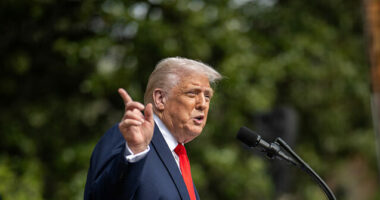Share this @internewscast.com
WASHINGTON — Late Thursday, President Donald Trump declared the termination of “all trade negotiations” with Canada, citing a controversial television advertisement that he claims misrepresented facts about U.S. tariffs. Trump labeled the ad as an “egregious behavior” attempting to sway American legal decisions.
This announcement appeared on Trump’s social media platform shortly after Canadian Prime Minister Mark Carney expressed his intention to boost Canadian exports to countries beyond the U.S., in response to the looming threat of Trump’s tariffs. The abrupt cessation of talks could heighten the existing trade tensions that have been simmering between the neighboring nations for several months.
Trump stated, “The Ronald Reagan Foundation has just revealed that Canada deceitfully used an advertisement, which is FAKE, showing Ronald Reagan speaking negatively about Tariffs.”
He further elaborated, “The advertisement cost $75,000. It was solely intended to disrupt decisions of the U.S. Supreme Court, and other courts. TARIFFS ARE CRUCIAL TO THE NATIONAL SECURITY AND ECONOMY OF THE U.S.A. Due to their outrageous conduct, ALL TRADE NEGOTIATIONS WITH CANADA ARE HEREBY TERMINATED.”
Prime Minister Carney’s office did not immediately provide a response to the situation. As Carney prepares to depart for an Asian summit on Friday morning, Trump is scheduled to follow suit later that evening.
Earlier on Thursday, the Ronald Reagan Presidential Foundation and Institute took to social media to clarify that an advertisement produced by Ontario’s government “misrepresents the ‘Presidential Radio Address to the Nation on Free and Fair Trade’ dated April 25, 1987.” The foundation also noted that Ontario did not have authorization “to use and edit the remarks.”
The foundation said it is “reviewing legal options in this matter” and invited the public to watch the unedited video of Reagan’s address.
Carney met with Trump earlier this month to try to ease trade tensions, as the two countries and Mexico prepare for a review of the U.S.-Mexico-Canada Agreement – a trade deal Trump negotiated in his first term, but has since soured on.
More than three-quarters of Canadian exports go to the U.S., and nearly $3.6 billion Canadian (US$2.7 billion) worth of goods and services cross the border daily.
Trump said earlier this week that he had seen the ad on television and said that it showed that his tariffs were having an impact.
“I saw an ad last night from Canada. If I was Canada, I’d take that same ad also,” he said then.
In his own post on X last week, Doug Ford, the premier of Ontario, posted a link to the ad and the message: “It’s official: Ontario’s new advertising campaign in the U.S. has launched.”
He continued, “Using every tool we have, we’ll never stop making the case against American tariffs on Canada. The way to prosperity is by working together.”
A spokesperson for Ford didn’t immediately respond to a request for comment Thursday night. But Ford previously got Trump’s attention with an electricity surcharge to U.S. states. Trump responded by doubling steel and aluminum tariffs.
The president has moved to impose steep U.S. tariffs on many goods from Canada. In April, Canada’s government imposed retaliatory levies on certain U.S. goods — but it carved out exemptions for some automakers to bring specific numbers of vehicles into the country, known as remission quotas.
Trump’s tariffs have especially hurt Canada’s auto sector, much of which is based in Ontario. This month, Stellantis said it would move a production line from Ontario to Illinois
Associated Press Writer Rob Gillies in Toronto, Ontario, contributed to this report.
.

















